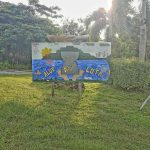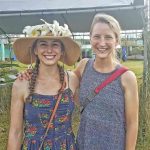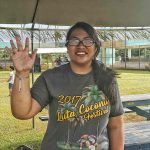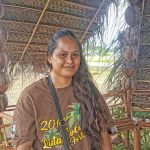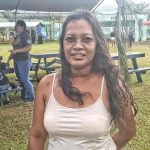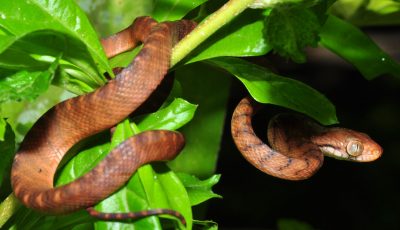Rota’s waving culture up close and personal
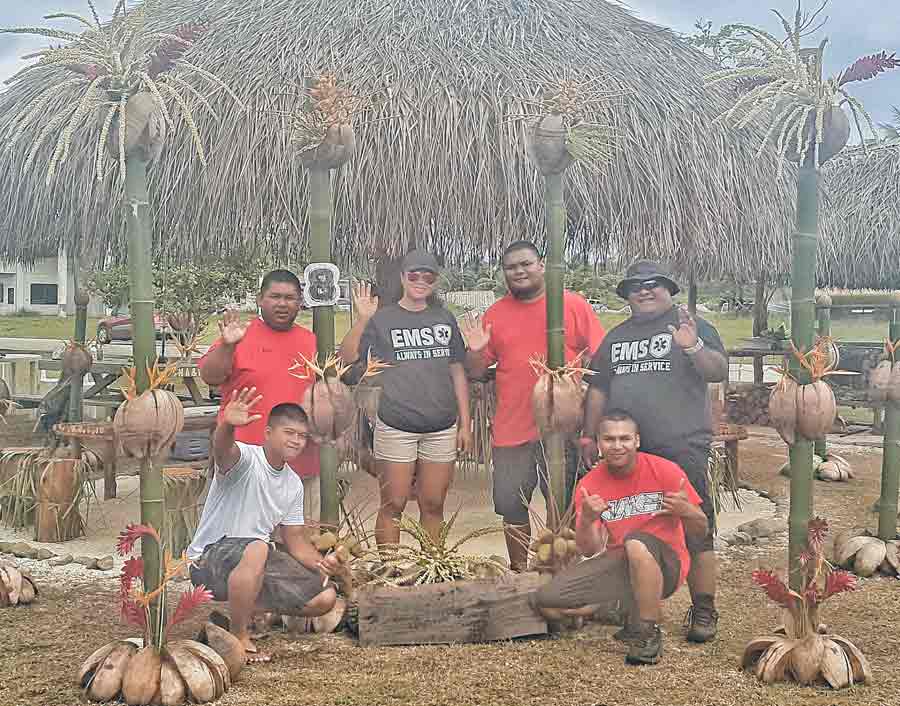
Bobbie Jean Taisacan waves with Rota firefighters. (Bea Cabrera)
ROTA—If you are a newcomer or even a returning visitor, expect an island resident to wave at you.
On Rota, everybody is equal, welcome, and the word stranger is alien to this place. Feel the warmth, friendliness, and the sense of belonging when you are on Rota and expect to see people wave at you, whether you know them or not.
That is how Rota conveys its hospitality.
“Growing up, ever since I can remember, we have been waving at people whether we know them or not,” said Rota resident Bobbie Jean Taisacan. “Rota is such a small island, we know each and everyone here. It’s a tradition that we continue to do. Waving at people is something I think that will go on for many years as we are a small community. If we see people from other islands we wave at them. It’s just the most natural thing to do. When I have my own kids, I would like them to pick up that trait.”
That common Rota trait is so ingrained that they have made it a part of a celebrated part of their culture, called “Aluf Luta.”
“‘Aluf’ is a Chamorro word that means hand wave,” explained another Rota resident, Aubrey Hocog. “We just always wave. What is so unique about Rota is it is instilled in the people to always show a way of welcoming not only visitors but also locals alike. When you are driving on the roads, you always see people wave at you. For me, I just grew up with it,” Hocog said.
It is also a sign of respect, she said. “Growing up, our parents would always tell us to show respect. So at home you say amen to your elders and then they bless you. Outside of the home, everywhere we go we just wave as a sign of respect.”
Saipan resident Gina Camacho loves the Rota wave. “In my opinion, it is unique because I only see it [on] Rota. It makes me feel welcome, I feel a part of the island. …I don’t think you will…see this [elsewhere].
“[On] Saipan we nod at each other but here it is literally the hand so you see immediately that people acknowledge you. It’s like they see me and they know I am here. That is the charm of Rota and I will come back again,” she said.
For Barbara Camacho, the Rota wave is an integral part of the island’s culture.
“I make sure I wave at people and they wave back. It’s funny because when I go off-island, I carry that trait with me and wave at people. Some find it strange but some wave back too. My children are accustomed to it so they know…it is just natural, you do it. My children and grandchildren are picking it up. I can say that this is one of the good traits of the people of Rota. We are known for being a friendly people and friendly island,” she said.
Another Rota resident, Cecilia Cerilla, said the waving culture is something passed on by one resident to another.
“I first experienced it when I landed on the island. My boss picked me up from the airport and saw him waving at everybody so I thought he knew everybody. Later, he explained that everybody waves. I went for a walk and I waved at like 60 cars or something and it does make you feel welcome,” she said.
Even visitors from off-island have taken up the hand-waving culture of Rota.
“I am here for research from the University of Washington. I really love the Rota wave. You drive down the road and you see people waving at you, it makes you feel welcome. I hope even if we are someplace else we carry on the trait but I do think it’s a Rota thing and that’s why it’s so special,” said Olivia Mitchell, who is from Utah.
Rota just celebrated Aluf Luta Week from Aug. 21 to Aug. 31. It marked the third year that the CNMI’s southernmost island celebrated the event to recognize hand waving and its role in Rota’s culture as a tradition that signifies peace, friendliness, and respect.
- A signboard that was drawn and painted by Rota school children promotes the Rota wave campaign. (Bea Cabrera)
- Rota residents Cecilla Cerilla, left, and Olivia Mitchell. (Bea Cabrera)
- Aubrey Hocog does the Rota wave. (Bea Cabrera)
- Gina Camacho from Saipan. (Bea Cabrera)
- Barbara Camacho from Rota. (Bea Cabrera)



